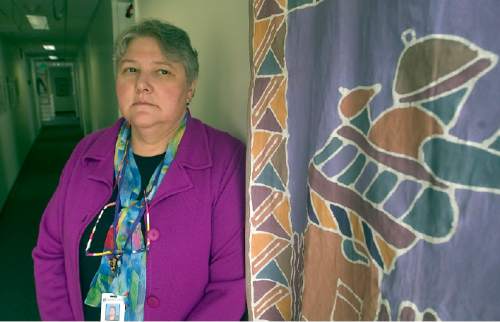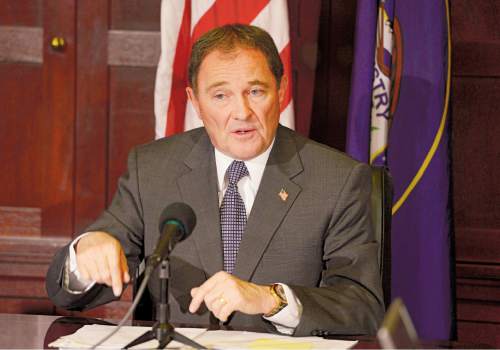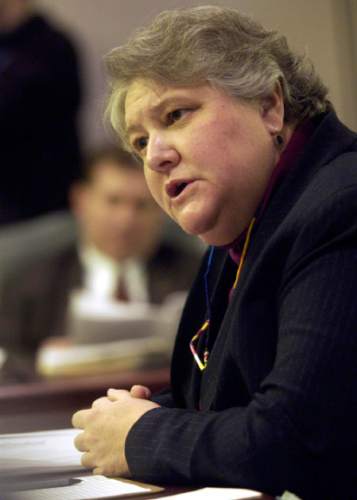This is an archived article that was published on sltrib.com in 2015, and information in the article may be outdated. It is provided only for personal research purposes and may not be reprinted.
The state has taken the first steps to terminate four grants to Planned Parenthood of Utah that fund programs monitoring sex education and sexually transmitted disease.
Utah's Department of Health is considering reallocating some of the funds to other providers, but apparently has yet to take steps to do so.
Two of the grants — one funding the development of a database to monitor the spread of STDs and the other paying $62,865 for comprehensive sex-education programs provided in schools — were set to expire at the end of the month and will not be renewed for another year, according to department spokesman Tom Hudachko.
An agreement with the state to conduct an estimated $75,000 worth of STD testing at the state lab — enough to cover about 4,400 samples — was due to expire at the end of the year and will not be renewed.
Another program providing Planned Parenthood with $57,700 to offer abstinence instruction in junior highs and high schools was expected to last another year but will be terminated, Hudachko said.
The state is looking at dividing the money that had been going to Planned Parenthood — about $120,000 total — among other grant recipients that administer sex-ed and abstinence-education programs, including several county health departments, Boys & Girls Clubs of Greater Salt Lake, Centro Hispano in Utah County, the Pregnancy Resource Center of Salt Lake and the National Tongan American Society.
—
Alternatives • Those other providers were already receiving $782,409 in money that passes through the Health Department from the federal government for the sex-ed instruction.
LeAnn Saldivar, president and CEO of the Boys & Girls Clubs, said her organization has been notified some additional funding may be available and she would be interested in expanding its sex-ed offerings.
"We do have capacity, and we do have kids who are not receiving the program who are eligible for it," she said. The club administers the program at two sites in Salt Lake City and one in Tooele.
"We feel that these programs are so important to these kids, so as many providers as can be in this game helping kids make good choices and healthy choices about their sexuality is important to us," she said. "So we're totally willing to help make sure those funds don't go unspent. There's plenty of need here in Salt Lake and in the county and throughout the state."
James Kerr, executive director of the Pregnancy Resource Center, said he has not been contacted by anyone from the governor's office about receiving additional funding, but believes his group would be able to expand its role in teaching abstinence.
"We have enough presenters and are processing some additional applications that we could expand if given the opportunity," Kerr said.
The center has been teaching its "Reality Check" curriculum mostly in Granite District schools for more than a decade, Kerr said, although there were years when the funds dried up and the program was halted. Last year, presenters taught the course to about 3,000 students in eighth grade and above.
To get the money, the providers would have to come up with their own money to match 46 cents of every dollar they would receive. Kerr said his organization does that now and could do the same to get additional funding, if asked.
—
Controversial videos • The notices the state has given to Planned Parenthood come after Gov. Gary Herbert ordered the move last month in response to the release of portions of a controversial video purportedly showing national Planned Parenthood officials discussing compensation for providing fetal tissue for scientific research.
The videos sparked fury from conservative groups, although Planned Parenthood said the recordings were doctored and misleading.
"The people of Utah are outraged. I'm outraged. So for coloring outside the lines, Planned Parenthood forfeits some of their benefits," Herbert said in an interview last month after issuing his executive order. "Let me assure you the monies we have right now are going to be put into the marketplace with other qualified providers; it just won't be going to Planned Parenthood."
Herbert announced his decision on the eve of the Utah Republican Convention, at which challenger Jonathan Johnson launched his campaign, criticizing the incumbent from the right.
House Minority Leader Brian King, D-Salt Lake City, said anti-abortion groups have seized on the videos to try to make abortion a hot-button issue, but "pandering" to the extremes could be counter-productive.
"There is so much about it that reeks of political expedience," King said. "And I really think it's going to cause STDs to rise. I think it's going to cause unintended pregnancy to rise, and because they are unintended pregnancies, I think it's going to cause increased abortion rates and I really think it's completely counter-productive."
Karrie Galloway, executive director of Planned Parenthood of Utah, has blasted Herbert's statement as politically motivated and damaging to the health of Utah women and the public.
She said the database created to track STDs is one example of a program that will suffer as a result of the governor's decision.
—
STD monitoring • "It has been a very successful partnership with the [U.S. Centers for Disease Control], the [Utah] Health Department and Planned Parenthood," Galloway said. "We have spoken with CDC. They are also bereft at the governor's actions, but federal legislation that issues the money has to go to a [state] health department and the governor says the Health Department can't partner with Planned Parenthood. So two years of work will end in a couple of weeks."
Hudachko said the STD monitoring system is running now and the state hopes Planned Parenthood will continue to provide information for the database. The third year of funding was intended to add a function to automatically notify state epidemiologists of test results that need to be followed up on, and to begin expanding the network to allow other health providers to feed information into the monitoring system.
"The quicker you learn about any disease outbreak, and especially STDs, and especially chlamydia, because it is the No. 1 communicable disease in the state … the quicker public health can come in with an action plan and try to stop the outbreak," Hudachko said.
If Planned Parenthood is no longer participating, he said, the state may speed up the expansion so there is still STD data feeding into the system.
Galloway said Planned Parenthood is committed to finding the resources for the STD testing and the educational programs. She said the organization had made commitments to its clients and the services are desperately needed. She said she is still researching what would go into continuing to share the STD tracking data.
Twitter: @RobertGehrke







